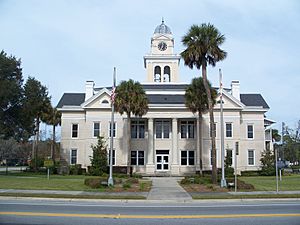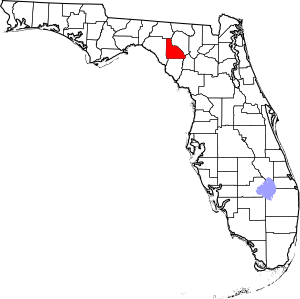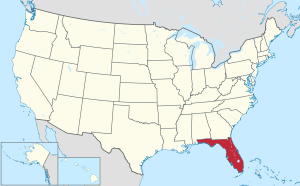Lafayette County, Florida facts for kids
Quick facts for kids
Lafayette County
|
|
|---|---|

Lafayette County Courthouse
|
|

Location within the U.S. state of Florida
|
|
 Florida's location within the U.S. |
|
| Country | |
| State | |
| Founded | December 23, 1853 |
| Named for | Marquis de Lafayette |
| Seat | Mayo |
| Largest town | Mayo |
| Area | |
| • Total | 548 sq mi (1,420 km2) |
| • Land | 543 sq mi (1,410 km2) |
| • Water | 4.5 sq mi (12 km2) 0.8%% |
| Population
(2020)
|
|
| • Total | 8,226 |
| • Density | 16/sq mi (6/km2) |
| Time zone | UTC−5 (Eastern) |
| • Summer (DST) | UTC−4 (EDT) |
| Congressional districts | 2nd, 3rd |
Lafayette County is a county in the north central part of Florida, a state in the United States. In 2020, about 8,226 people lived there. This makes it the second-smallest county in Florida by population. The main town and county seat is Mayo. Lafayette County is known as a "partially dry county," which means it allows stores to sell beer.
Contents
History of Lafayette County
Lafayette County was created on December 23, 1856. It was formed from a part of Madison County. At first, it included all the land that is now Lafayette and Dixie counties.
The county was named after the Marquis de Lafayette. He was a French general who helped the American army during the American Revolutionary War. The famous Suwannee River forms the entire eastern border of the county.
The county's first courts met at Ariel Jones's home near Fayetteville. The county seat was New Troy until the courthouse burned down on New Year's Eve in 1892. The county seat then moved to Mayo in 1893. Mayo is still Lafayette County's only official town today. Moving the courthouse meant the end for New Troy. Houses were taken apart for their wood and bricks. Steamboat travel stopped in 1899, and the ferry closed in 1917. In 1921, the southern part of the county was used to create Dixie County.
Historic Places to Visit
Lafayette County has several interesting historic places:
- The Hal W. Adams Bridge was built in 1947. It crosses the Suwannee River about 3 miles (5 km) north of Mayo. It was Florida's first suspension bridge.
- The (second) Old Lafayette County Courthouse was built in 1893–1894. It is now an inn.
- The current Lafayette County Courthouse was built in 1908.
Geography of Lafayette County
Lafayette County covers a total area of 548 square miles (1,419 square kilometers). Most of this area, 543 square miles (1,406 square kilometers), is land. Only 4.5 square miles (12 square kilometers), or 0.8%, is water.
Neighboring Counties
Lafayette County shares borders with these other counties:
- Suwannee County to the east
- Gilchrist County to the southeast
- Dixie County to the south
- Taylor County to the west
- Madison County to the northwest
Population and People
| Historical population | |||
|---|---|---|---|
| Census | Pop. | %± | |
| 1860 | 2,068 | — | |
| 1870 | 1,783 | −13.8% | |
| 1880 | 2,441 | 36.9% | |
| 1890 | 3,686 | 51.0% | |
| 1900 | 4,987 | 35.3% | |
| 1910 | 6,710 | 34.5% | |
| 1920 | 6,242 | −7.0% | |
| 1930 | 4,361 | −30.1% | |
| 1940 | 4,405 | 1.0% | |
| 1950 | 3,440 | −21.9% | |
| 1960 | 2,889 | −16.0% | |
| 1970 | 2,892 | 0.1% | |
| 1980 | 4,035 | 39.5% | |
| 1990 | 5,578 | 38.2% | |
| 2000 | 7,022 | 25.9% | |
| 2010 | 8,870 | 26.3% | |
| 2020 | 8,226 | −7.3% | |
| 2023 (est.) | 8,078 | −8.9% | |
| U.S. Decennial Census 1790-1960 1900-1990 1990-2000 2010-2019 |
|||
In 2020, there were 8,226 people living in Lafayette County. There were 2,315 households and 1,655 families. Most people in the county are White (73.84%). About 12.45% are Black or African American, and 11.4% are Hispanic or Latino.
In 2000, the population density was about 13 people per square mile (5 people per square kilometer). About 34% of households had children under 18 living with them. The average household had 2.66 people.
The population was spread out by age. About 21.7% were under 18 years old. About 34% were between 25 and 44 years old. The median age was 35 years. This means half the people were younger than 35 and half were older.
The average income for a household in 2000 was $30,651. For families, it was $35,020. About 17.5% of the population had lower incomes. This included 23.7% of those under 18.
Parks and Recreation
Lafayette County has some great parks to explore. These include Lafayette Blue Springs State Park and Troy Spring State Park. Both parks offer access to the beautiful Suwannee River.
Library Services
The Lafayette County Public Library is part of the Three Rivers Regional Library System. This system also serves Gilchrist, Dixie, and Taylor counties.
Communities in Lafayette County
Town
Census-designated place
Other Unincorporated Communities
These are smaller communities that are not officially towns:
- Airline
- Alton
- Buckville
- Cooks Hammock
- Hatchbend
- Midway
See also
 In Spanish: Condado de Lafayette (Florida) para niños
In Spanish: Condado de Lafayette (Florida) para niños
 | Chris Smalls |
 | Fred Hampton |
 | Ralph Abernathy |

